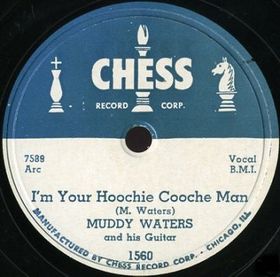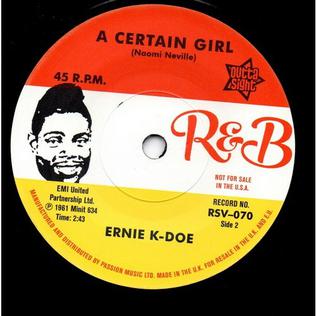
McKinley Morganfield, known professionally as Muddy Waters, was an American blues singer and musician who was an important figure in the post-war blues scene, and is often cited as the "father of modern Chicago blues". His style of playing has been described as "raining down Delta beatitude".

Muddy Waters (1913–1983) was an American blues artist widely considered to be one of the most important figures in post-World War II Chicago blues. He popularized several early Delta blues songs, such as "Rollin' and Tumblin'", Walkin' Blues", and "Baby, Please Don't Go", and recorded songs that went on to become blues standards, including "Hoochie Coochie Man", "Mannish Boy", and "Got My Mojo Working". During his recording career from 1941 to 1981, he recorded primarily for two record companies, Aristocrat/Chess and Blue Sky; they issued 62 singles and 13 studio albums.

Jimmy Rogers was an American Chicago blues singer, guitarist and harmonica player, best known for his work as a member of Muddy Waters's band in the early 1950s. He also had a solo career and recorded several popular blues songs, including "That's All Right", "Chicago Bound", "Walking by Myself", and "Rock This House". He withdrew from the music industry at the end of the 1950s, but returned to recording and touring in the 1970s.
Electric blues refers to any type of blues music distinguished by the use of electric amplification for musical instruments. The guitar was the first instrument to be popularly amplified and used by early pioneers T-Bone Walker in the late 1930s and John Lee Hooker and Muddy Waters in the 1940s. Their styles developed into West Coast blues, Detroit blues, and post-World War II Chicago blues, which differed from earlier, predominantly acoustic-style blues. By the early 1950s, Little Walter was a featured soloist on blues harmonica using a small hand-held microphone fed into a guitar amplifier. Although it took a little longer, the electric bass guitar gradually replaced the stand-up bass by the early 1960s. Electric organs and especially keyboards later became widely used in electric blues.

Otis Spann was an American blues musician, whom many consider to be the leading postwar Chicago blues pianist.

Freddie King was an American blues guitarist, singer and songwriter. He is considered one of the "Three Kings of the Blues Guitar". Mostly known for his soulful and powerful voice and distinctive guitar playing, King had a major influence on electric blues music and on many later blues guitarists.

James Henry Cotton was an American blues harmonica player, singer and songwriter, who performed and recorded with many of the other great blues artists of his time and with his own band. He played drums early in his career but is famous for his harmonica playing.

"You Shook Me" is a 1962 blues song recorded by Chicago blues artist Muddy Waters. Willie Dixon wrote the lyrics and Earl Hooker provided the instrumental backing; the song features Waters' vocal in unison with Hooker's slide-guitar melody. "You Shook Me" became one of Muddy Waters' most successful early-1960s singles and has been interpreted by several blues and rock artists.
The American Folk Blues Festival was a music festival that toured Europe as an annual event for several years beginning in 1962. It introduced audiences in Europe, including the UK, to leading blues performers of the day such as Muddy Waters, Howlin' Wolf, John Lee Hooker and Sonny Boy Williamson, most of whom had never previously performed outside the US. The tours attracted substantial media coverage, including TV shows, and contributed to the growth of the audience for blues music in Europe.
"Make It Easy on Yourself" is a popular song written by Burt Bacharach and Hal David which was first a hit for Jerry Butler in 1962. The best known version is the 1965 recording by the Walker Brothers for whom it was a No. 1 UK hit. Dionne Warwick, who made a demo of this song in early 1962, later had a hit with the song in 1970.

"Hoochie Coochie Man" is a blues standard written by Willie Dixon and first recorded by Muddy Waters in 1954. The song makes reference to hoodoo folk magic elements and makes novel use of a stop-time musical arrangement. It became one of Waters' most popular and identifiable songs and helped secure Dixon's role as Chess Records' chief songwriter.

Take It Easy with the Walker Brothers is the debut album by the American pop group the Walker Brothers. It is also commonly known as Take It Easy. The group's musical accompaniment was directed by Ivor Raymonde and produced by John Franz and Nick Venet. It was released in 1965 and reached number three on the UK Albums Chart. The album contains the group's first major hit single "Make It Easy on Yourself". Receiving good to mixed reviews, the album was released in both Mono and Stereo LP formats in November 1965. The album was later released on CD having been remastered and expanded in 1998. The sleeve notes were written by Brian Mulligan, the then press officer for Philips Records, with photography by Terence Donovan.

Willie Lee "Big Eyes" Smith was an American electric blues vocalist, harmonica player, and drummer. He was best known for several stints with the Muddy Waters band beginning in the early 1960s.
"I'm Ready" is a blues song written by Willie Dixon and first recorded by Muddy Waters in 1954. It was a hit, spending nine weeks on the Billboard R&B chart where it reached number four. The song became a blues standard and has been compared to "Hoochie Coochie Man", the standard also written by Dixon that Waters recorded earlier in 1954.

Steppin' Out is a compilation album of songs featuring Eric Clapton, released in 1981. It contains eight of the 12 tracks that appeared originally on John Mayall's Blues Breakers with Eric Clapton in 1966, plus a Mayall/Clapton single, "Lonely Years," two tracks from a 1966 recording session by Champion Jack Dupree on which Clapton played guitar, and "Pretty Girls Everywhere", which is from an Otis Spann session, also featuring Clapton.
Sammy David Lawhorn was an American Chicago blues guitarist, best known as a member of Muddy Waters's band. He also accompanied many other blues musicians, including Otis Spann, Willie Cobbs, Eddie Boyd, Roy Brown, Big Mama Thornton, John Lee Hooker, James Cotton and Junior Wells.
Johnny "Big Moose" Walker was an American Chicago blues and electric blues pianist and organist. He worked with many blues musicians, including Ike Turner, Sonny Boy Williamson II, Lowell Fulson, Choker Campbell, Elmore James, Earl Hooker, Muddy Waters, Otis Spann, Sunnyland Slim, Jimmy Dawkins and Son Seals.
Ransom Knowling was an American rhythm and blues musician, best known for playing bass on many blues recordings made in Chicago between the 1930s and 1950s, including those of Arthur Crudup and Little Brother Montgomery.

"A Certain Girl" is a rhythm and blues song written by Allen Toussaint, with the credit listed under his pen name Naomi Neville. New Orleans R&B singer Ernie K-Doe recorded it in 1961. Minit Records released the song as the B-side of "I Cried My Last Tear".

The Blues of Otis Spann is an album by blues pianist and vocalist Otis Spann recorded in London in 1964 and released by the UK Decca label.













